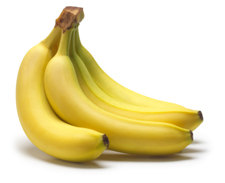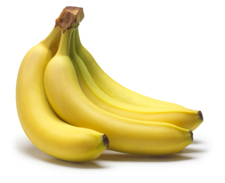
 Ah, the reliable, infinitely safe and very healthy banana. It’s bright yellow color radiates tropical warmth and sunshine, and its handy, almost zip-locked casing makes it a natural convenience snack. Yet, after seeing how bananas are harvested while on a recent eco- tour of Costa Rica, I don’t think that I can ever eat another in the same take-it-for-granted way that I always have.
Ah, the reliable, infinitely safe and very healthy banana. It’s bright yellow color radiates tropical warmth and sunshine, and its handy, almost zip-locked casing makes it a natural convenience snack. Yet, after seeing how bananas are harvested while on a recent eco- tour of Costa Rica, I don’t think that I can ever eat another in the same take-it-for-granted way that I always have.
I suppose that, when visiting the Chiquita plantation, I had expected to see a typical agribusiness operation, with modern technology used to at least do the crudest work. And, while I clearly did not expect to find happy and dancing peasants, what I did see was a level of back-breaking work that was surprising in its primitiveness. The only hint of modern, if you will, was that all the hanging banana clusters are encased in blue plastic bags to prevent bruising and over-ripening.
Yet it was the overhead pulleys that really seemed, at first, so out of place in these sun-drenched fields. The vast networks of wire are used by mules, you see, to transport about three hundred or so pounds of carefully balanced stalk bananas at a time to the place where they’re checked, separated and prepped for export or local consumption. No big deal, right?
Except, that is, for the fact that the mules here are people. Sweaty, scrawny young guys who, after helping to chop down hands of bananas with machetes, carefully lay them over the wires (which are attached to the pulleys) and run, at a fair clip, several hundred yards from the field to the plant. And that’s what they do for about ten hours a day, six days a week. In a democratic, high standard of living country, after all.
I suppose that hey, someone’s gotta do this kind of work, and I’m damned glad that it isn’t me. Nor do I want to sound like a bleeding heart gliberal by having the temerity to tell Chiquita how to run its’ business. Because if, lets’ say, they were to use tractors instead of human mules, then think of all the entry-level positions that would be eliminated, as well as the reduction in cultivatable space. All of which leads to increased poverty and all of its associated ills. And anyway, it sure beats chopping sugar cane, where you have to fend off the venomous snakes that really like their roots.
So, and while there’s clearly no moral to this story, it is just another reminder of how good, in the overall scheme of things, that we’ve really got it here. Now all we have to do is enjoy it!
Leave a Reply